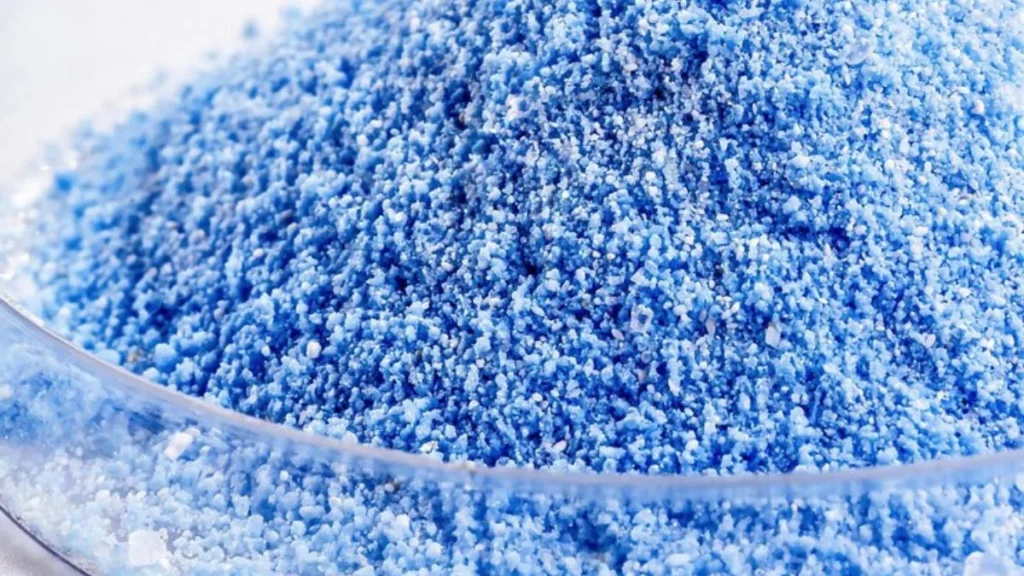Can you use Copper Sulfate Pentahydrate for Ellman’s Condensation? This is a question that piques the interest of chemists and researchers working in organic synthesis. Ellman’s Condensation, a powerful reaction in organic chemistry, often requires specific catalysts and conditions to achieve optimal results. Copper sulfate pentahydrate, a common and versatile compound, may play a role in this process. In this comprehensive blog, we’ll explore whether copper sulfate pentahydrate can be effectively used in Ellman’s Condensation, its potential benefits, and the science behind it.
Introduction
Can you use Copper Sulfate Pentahydrate for Ellman’s Condensation? This inquiry is crucial for those involved in synthesizing compounds through this reaction. Ellman’s Condensation, named after the chemist G. Ellman, involves the formation of α,β-unsaturated carbonyl compounds through the condensation of carbonyl compounds with α,β-unsaturated systems. The reaction typically requires specific catalysts to drive it efficiently.
Copper sulfate pentahydrate (CuSO₄·5H₂O) is well-known for its use in various chemical processes, including as a reagent and catalyst. This blog will delve into the applicability of copper sulfate pentahydrate in Ellman’s Condensation, exploring its role, effectiveness, and potential advantages or limitations.
Understanding Ellman’s Condensation
Can you use Copper Sulfate Pentahydrate for Ellman’s Condensation? To answer this, it’s important to first understand the Ellman’s Condensation process. This reaction is used to form α,β-unsaturated carbonyl compounds, which are valuable intermediates in organic synthesis.
The Basics of Ellman’s Condensation
Ellman’s Condensation involves the reaction of carbonyl compounds with α,β-unsaturated systems in the presence of a catalyst. The reaction generally follows these steps:
- Formation of the Enolate Ion: A base abstracts a proton from the carbonyl compound, forming an enolate ion.
- Nucleophilic Attack: The enolate ion then attacks the α,β-unsaturated system, forming a new carbon-carbon bond.
- Formation of the Product: The reaction yields the α,β-unsaturated carbonyl compound as the final product.
Traditional Catalysts for Ellman’s Condensation
Typically, strong bases or specific metal catalysts are used for Ellman’s Condensation. Examples include:
- Alkali Metal Hydrides: Such as sodium hydride (NaH) or potassium hydride (KH).
- Metal Catalysts: Including palladium, platinum, or nickel complexes.
These catalysts are chosen for their ability to efficiently drive the reaction by facilitating the formation of the enolate ion or promoting the nucleophilic attack.
Copper Sulfate Pentahydrate: An Overview
Can you use Copper Sulfate Pentahydrate for Ellman’s Condensation? To assess this, let’s first examine the properties and common uses of copper sulfate pentahydrate.
Chemical Properties
Copper sulfate pentahydrate is a blue, crystalline solid with the formula CuSO₄·5H₂O. It is highly soluble in water and dissociates into copper ions (Cu²⁺) and sulfate ions (SO₄²⁻). Its key properties include:
- Catalytic Potential: Copper sulfate can act as a catalyst in various reactions, owing to its ability to participate in electron transfer processes.
- Oxidizing Agent: It can function as an oxidizing agent, facilitating certain chemical transformations.
Common Uses
Copper sulfate pentahydrate is widely used in:
- Agriculture: As a fungicide and herbicide.
- Electroplating: In the deposition of copper onto surfaces.
- Chemical Reactions: As a reagent or catalyst in various organic syntheses.
Potential Role of Copper Sulfate Pentahydrate in Ellman’s Condensation
Can you use Copper Sulfate Pentahydrate for Ellman’s Condensation? The answer lies in examining how copper sulfate pentahydrate might function in this specific reaction.
Theoretical Basis
- Catalytic Activity: Copper sulfate, being a transition metal salt, could potentially influence the reaction mechanism. Its catalytic activity might facilitate the formation of enolate ions or stabilize intermediates.
- Oxidizing Properties: The oxidizing nature of copper sulfate could potentially affect the reaction pathway or the stability of intermediates.
Experimental Evidence
Studies and experiments are needed to determine the actual effectiveness of copper sulfate pentahydrate in Ellman’s Condensation. Research would typically involve:
- Reaction Conditions: Testing various concentrations and conditions to see if copper sulfate pentahydrate can replace traditional catalysts effectively.
- Product Yields: Comparing the yields and purity of products obtained with and without copper sulfate pentahydrate.
Read More Article : How Covatza3.9 Software is Helpful: A Comprehensive Guide See More..
Advantages and Limitations
Can you use Copper Sulfate Pentahydrate for Ellman’s Condensation? Let’s weigh the potential benefits and limitations of using copper sulfate pentahydrate in this reaction.
Advantages
- Cost-Effectiveness: Copper sulfate pentahydrate is relatively inexpensive compared to some traditional metal catalysts.
- Accessibility: It is readily available and easy to handle in a laboratory setting.
- Environmental Impact: Using a less toxic catalyst like copper sulfate could be beneficial for greener chemistry.
Limitations
- Reaction Efficiency: Copper sulfate may not be as efficient as traditional catalysts, potentially leading to lower yields or longer reaction times.
- Side Reactions: There could be unwanted side reactions or interactions with other components in the reaction mixture.
- Optimization Required: Specific conditions and concentrations need to be optimized for copper sulfate to be effective, which may require extensive experimentation.
Practical Considerations
When considering can you use Copper Sulfate Pentahydrate for Ellman’s Condensation, it is essential to evaluate practical factors, including:
- Reaction Setup: Ensure that the reaction setup can accommodate copper sulfate pentahydrate and that it is compatible with other reagents.
- Safety Precautions: Follow appropriate safety measures when handling copper sulfate pentahydrate, as it can be hazardous if ingested or inhaled.
Case Studies and Research
To answer the question conclusively, reviewing case studies and research involving copper sulfate pentahydrate in similar reactions can provide valuable insights.
- Literature Review: Examine existing literature for any documented uses of copper sulfate pentahydrate in Ellman’s Condensation or related reactions.
- Experimental Studies: Review experimental results from studies that have tested copper sulfate pentahydrate as a catalyst in various organic syntheses.
Potential Alternatives to Copper Sulfate Pentahydrate in Ellman’s Condensation
While copper sulfate pentahydrate presents an intriguing option for Ellman’s Condensation, researchers may also explore other catalysts that have proven effective in similar reactions. Alternatives such as palladium, platinum, or nickel-based catalysts often provide higher efficiency and better yields. These metals are known for their robust catalytic properties and ability to facilitate complex organic transformations. When considering alternatives, it’s crucial to compare their performance with copper sulfate pentahydrate in terms of reaction rate, product purity, and overall cost-effectiveness. Each catalyst brings unique benefits and challenges, influencing the choice based on specific experimental requirements.
Environmental Impact of Using Copper Sulfate Pentahydrate
The environmental impact of using copper sulfate pentahydrate as a catalyst in Ellman’s Condensation is an important consideration. While copper sulfate is less toxic than some alternatives, its use still requires proper handling and disposal to minimize environmental risks. Copper compounds can be harmful in large quantities, potentially affecting aquatic life and soil health if not managed correctly. Implementing green chemistry principles, such as using minimal quantities and ensuring proper waste management, can mitigate these concerns. Researchers should evaluate the ecological footprint of their catalyst choice to align with sustainable practices and reduce environmental harm.
Conclusion
Can you use Copper Sulfate Pentahydrate for Ellman’s Condensation? The answer is not straightforward and requires careful consideration of the reaction conditions, catalytic efficiency, and potential advantages or limitations. While copper sulfate pentahydrate offers several benefits, including cost-effectiveness and environmental friendliness, its effectiveness compared to traditional catalysts remains to be fully demonstrated.
For those interested in exploring this possibility, conducting experimental studies and consulting existing research are crucial steps. As chemistry continually evolves, finding innovative solutions and alternative catalysts can lead to more sustainable and efficient synthetic processes.
Embracing new approaches like the potential use of copper sulfate pentahydrate in Ellman’s Condensation can contribute to advancing the field of organic chemistry and achieving better results in various chemical syntheses.
FAQs
1. What is Ellman’s Condensation?
Ellman’s Condensation is a chemical reaction used to form α,β-unsaturated carbonyl compounds by reacting carbonyl compounds with α,β-unsaturated systems. It requires specific catalysts to drive the reaction effectively.
2. What is Copper Sulfate Pentahydrate?
Copper sulfate pentahydrate (CuSO₄·5H₂O) is a blue, crystalline compound used in various applications, including as a reagent and catalyst in chemical reactions. It is known for its solubility in water and its catalytic properties.
3. Can Copper Sulfate Pentahydrate be used in Ellman’s Condensation?
The potential use of copper sulfate pentahydrate in Ellman’s Condensation is a subject of investigation. Its catalytic activity and properties may offer advantages, but its effectiveness compared to traditional catalysts requires further study.
4. What are the advantages of using Copper Sulfate Pentahydrate?
Copper sulfate pentahydrate is cost-effective, readily available, and potentially offers environmental benefits as a less toxic catalyst. These factors make it an attractive option for consideration in various chemical reactions.
5. What are the limitations of using Copper Sulfate Pentahydrate in this reaction?
Limitations include potential lower efficiency compared to traditional catalysts, possible side reactions, and the need for optimization of reaction conditions. Extensive experimentation is required to determine its effectiveness in Ellman’s Condensation.






